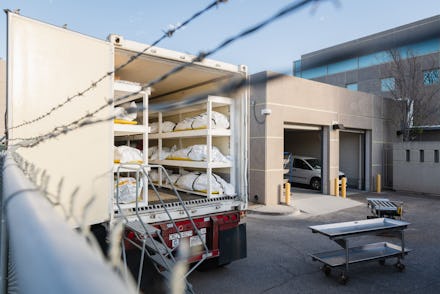Texas inmates are reportedly moving dead bodies between mobile morgues for $2 an hour

The coronavirus pandemic is hurting some people more than others, with people living inside prisons and jails hardest hit. Those on the front lines of the pandemic — nurses, doctors, service workers — are also particularly vulnerable to the deadly virus. For people incarcerated in the county jail in El Paso, Texas, they're both: vulnerable because prisons are not built to promote public health, and, according to The Texas Tribune, being paid $2 per hour to do front-line work assisting the El Paso morgue.
According to The Texas Tribune, the incarcerated people are working eight-hour shifts in mobile morgues set up near the El Paso medical examiner's office. Chris Acosta, a spokesperson for the El Paso County Sheriff’s Office, did not elaborate to the Tribune about the nature of the work, though from Tribune photos it appears that the workers are moving bodies enclosed in white medical coverings between mobile set-ups.
A surge in coronavirus infections in El Paso, coupled with the lack of resources the city has access to, has led to an increase in COVID-19 deaths. It's not uncommon for incarcerated people to labor for poverty wages for the counties or states where they're incarcerated. Infamously, at the very beginning of the pandemic, New York Gov. Andrew Cuomo (D) announced that the state would make its own hand sanitizer, conveniently leaving out the part where it would be made via underpaid prison laborers.
The fact that incarcerated people lack the ability to socially distance, wash their hands regularly, and have to reuse personal protective equipment (all of which are required for maintaining personal and public health) already endagers their wellbeing during a pandemic. That they're being exploited for labor too points to the gap in state and federal coronavirus response; Acosta told the Tribune that the incarcerated workers are on a temporary assignment at the morgue until the National Guard arrives to assist. According to local ABC affiliate station KVIA, there's no indication as to when the National Guard will arrive.
Because they're incarcerated, the county is allowed to pay the workers poverty wages for their labor. Even still, the opportunity to earn money and be outside can be more appealing than the realities of everyday incarceration. This is the so-called "choice" that incarcerated folks are forced to make when presented with work opportunities — it's perhaps better than nothing, but it's still exploitation. Furthermore, incarcerated people may want to work, but it's rare that they're able to choose what kind of work they do.
The news of incarcerated workers assisting the county morgue broke less than a week after the University of Texas at Austin released a report on the dire coronavirus crisis within the state's prisons and jails. As Mic wrote last week:
According to the report, "More people in Texas prisons have contracted COVID than in any other prison system in the United States." The raw numbers of individuals who have passed away as a result of COVID-19 infections are harrowing: From March through Oct. 4, the range of time studied by UT, 231 people died in Texas state jails and prisons alone, including 27 staffers.
But that's not all. In Texas county jails, 80% of those who died from a COVID-19 infection were never even convicted of a crime. The El Paso county jail has reported one death — which is in line with multiple other counties and significantly lower than Harris County — but that's really just one data point that does not tell the whole story of the ongoing crisis in Texas facilities.